Post-school funding body landscape simplification: outline business case
Appraisal of three shortlisted options to simplify Scotland’s post-school funding body landscape. This Project aims to strengthen the foundations and build a flexible, agile and responsive post-school education, skills and research system to meet Scotland's needs.
6. Management Case
6.1 Introduction
The purpose of the Management Case is to provide confidence that recognised
project management methods and robust governance arrangements are planned, or are in place, to deliver this specific Project to time, cost and quality.
This Management Case is in two parts; one to set out the project and programme structures that have been in place to support the development of this OBC; and the second, to provide early thoughts on the project structures that will require to be put in place to develop detailed, shared implementation plans sufficient to ensure successful delivery of the preferred option, once Ministers have reached a decision.
Successful delivery of this project is predicated on progressing the next phase of work to develop the implementation plan and delivery structures in partnership with SAAS, SFC and SDS and ensuring the knowledge and expertise of their dedicated and committed staff can be brought to bear on designing a new system that is fit for the future.
This means the Management Case for future delivery is high level at this stage. It sets out an indicative timeline for work, a benefits realisation approach and focuses on the principles for developing a more detailed implementation plan, in partnership, once a decision has been made. This will be vital to ensure there is confidence that the delivery capabilities, management strategies and project and programme governance are in place to deliver transformation to the required high standards.
6.2 Timelines for development of OBC
Figure 3 below sets out the timeline and phases for development of the Strategic Outline Case and further development to the conclusion of this Outline Business Case process resulting in a Ministerial decision on the preferred way forward before embarking upon more detailed development of implementation plans.
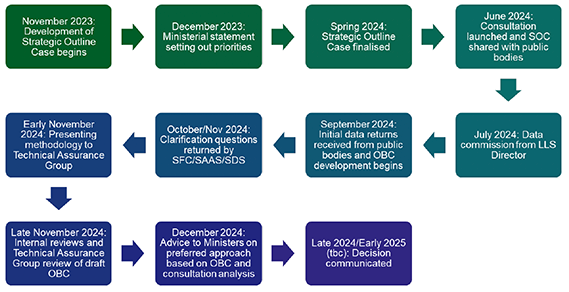
6.3 Governance and Reporting Arrangements for development of the OBC
The development of the OBC has been overseen by an internal Scottish Government Project Board and Programme Board. The Boards supported delivery and strategic direction, provided a forum for discussion and escalation of risks and issues and enabled timely decision-making at an appropriate level of authority. They were also vital in providing assurance to senior leaders within the Scottish Government and Ministers on progress with the work.
The internal governance arrangements and Ministerial oversight reflect the cross-cutting nature of the Project with the Programme Board in particular drawing in representation from areas within core Scottish Government in scope or potentially impacted by the changes to simplify the post-school funding body landscape. This included Directors for Economic Strategy and Delivery, Tackling Child Poverty and Social Justice, and Public Service Reform given the Project’s potential impact on outcomes in these areas.
More information about the governance and reporting arrangements is set out below.
6.3.1 Portfolio Level Governance
Simplification of the post-school funding landscape is a workstream within the public bodies reform project, which is in turn, part of the post-school education and skills reform programme. This project reports into the internal, Scottish Government post-school education and skills reform programme and project Boards, and subsequently, through wider governance structures, for example, those tracking delivery of Programme for Government. The post-school education and skills reform programme is part of a wider governance structure covering the education and skills reform portfolio.
At portfolio level, this considers the lifelong education and skills system in the round, particularly the links between education reform and post-school education and skills reform but also bringing in early years.
Figure 4 below shows the cross-programme governance structures that have been agreed by Ministers.
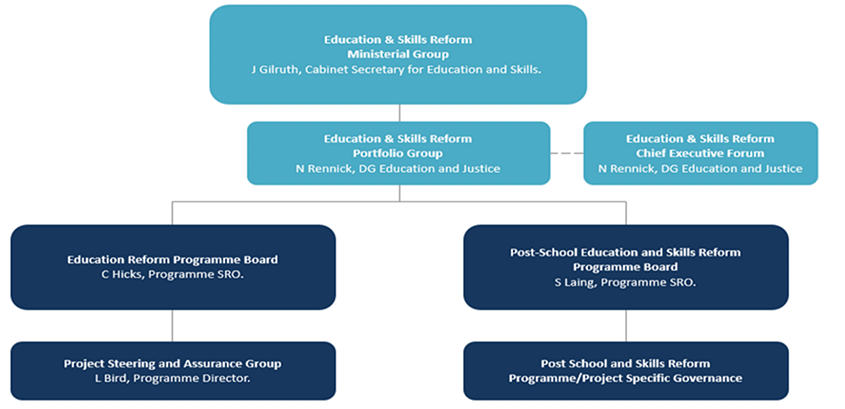
The Ministerial Group on Education and Skills Reform was announced by the Cabinet Secretary for Education and Skills in November 2023 and its role is to provide a forum for Ministers to seek views from the profession and independent experts on the opportunities and challenges within the education and skills sector. The group meets around twice per year.
The Education and Skills Portfolio Group is chaired by the Director General for Education and Justice as Principle Accountable Officer for Education and Skills Reform. All lead Directors attend for their programmes.
The Chief Executive Forum for Education and Skills Reform was established in January 2024 and meets quarterly. It provides an opportunity to bring together all public body Chief Executives directly affected by reform with the relevant senior officials across Scottish Government to discuss progress and next steps with the Education and Skills Reform Programme. Again, it is chaired by the Director General for Education and Justice.
6.3.2 Programme Level Governance
The post-school education & skills reform programme is currently made up of five projects, each at varying stages of maturity.
These projects are represented in Figure 5 below:
- Skills Planning.
- Apprenticeship Reform.
- Simplification of the Funding Body Landscape.
- Post-school Qualifications.
- Careers Support.
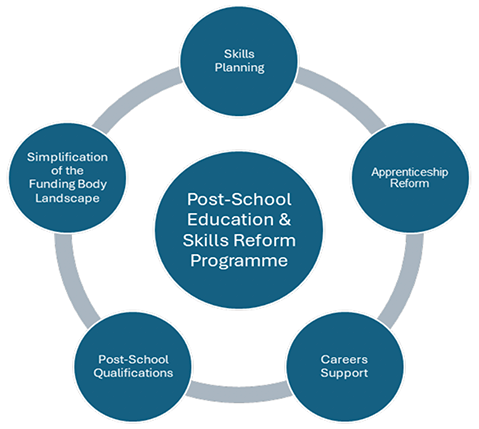
The governance of the development of the OBC is aligned with the governance arrangements of the wider programme. At present, work specific to individual projects will adopt their own structures appropriate to the stage of their work, noting that each project is at a different level of maturity. It is expected that project and programme level governance, in particular membership, will adapt and change as projects and programmes reach different stages of maturity.
The programme board meets on a six weekly basis and provides strategic oversight, governance and assurance on the post-school education and skills reform programme.
It reports directly to the Minister for Further and Higher Education and Cabinet Secretary for Education and Skills through the DG Education and Skills Reform Portfolio Group.
The board bolsters strategic capabilities and assurance on the post-school education and skills reform programme on behalf of the Director General Education and Justice (DGEJ) as Accountable Officer (AO). The post-school education and skills reform programme is also included on the DG Transformational Projects Register.
The programme board scrutinises strategic risks identified and provides an additional layer of risk assurance/escalation, informing the Corporate Risk Management approach and providing further independent view of risk management.
At present, the board is internal to the Scottish Government and is comprised of Scottish Government Directors and the Lifelong Learning and Skills Senior Leadership Team who are SROs for the individual projects that make up the Reform Programme. Membership of the Programme Board will be kept under review and may be adapted and updated to include external representatives as the programme reaches different stages of development.
6.3.3 Project Level Governance
Figure 6 below shows the project level governance for the Public Bodies Reform project. The development of the Outline Business Case for simplification of the funding body landscape is one workstream within that project. This Project Board has considered the project plan, risks and issues and is the escalation route between the project and programme board; signing off the highlight report and any substantive updates in advance of programme board meetings. The Public Bodies Reform Project Board has been internal to Scottish Government to date and has included colleagues responsible for Finance, Education Reform and other projects within the programme.
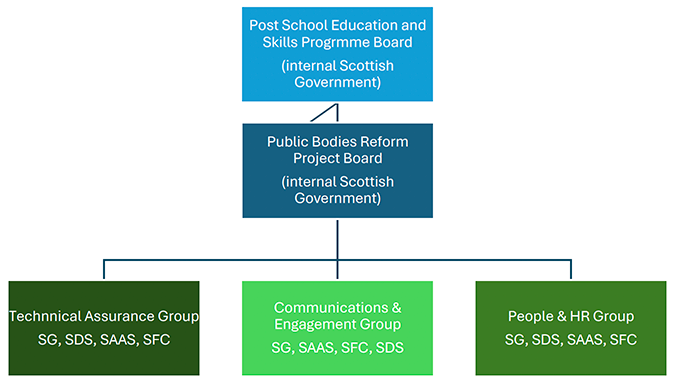
To support the development of the OBC and the communication of wider reform programme priorities to public bodies, and to consider any people and HR issues, three groups have been established.
6.3.4 Technical Assurance Group
The Technical Assurance Group has included senior representation from the three public bodies and has supported the development and assurance of the technical returns that were commissioned by the Scottish Government in the summer and returned from each public body. This group has supported the gathering of further information and questions for clarification from the initial submissions. This group has also considered the methodology the project team has applied to development of the OBC and has checked elements of the business case for factual accuracy, providing assurance where appropriate.
It was originally envisaged that technical working groups would be required to support the baselining and appraisal activity for the OBC with the Technical Assurance Group sitting above these groups and quality assuring and signing off outputs from each subgroup.
It was proposed there would be four technical working groups:
- Apprenticeships and other national training programmes.
- College provision.
- University provision.
- Student support.
The approach taken to baselining and appraisal of the options within the OBC evolved as information was received from public bodies.
As a result, members of the Technical Assurance Group were asked to support coordination of:
- Baselining of funding processes carried out by each of the public bodies (SDS, SFC, SAAS) setting out all types of provision and student support and the detailed process maps held by each organisation.
- Baselining of the financial data has been conducted by each of the public bodies (SDS, SFC, SAAS) - reviewing their own financial costs related to funding of provision and student support.
- Providing the necessary links to expertise within their public bodies to address any areas for clarification or where further detail was required.
The data returns commissioned provided a significant amount of the technical information and detail required to develop the OBC. This negated the need to establish the technical working groups in the way that had originally been envisaged to deliver the OBC. Instead, engagement with the public bodies on the OBC primarily flowed through the Technical Assurance Group, with detailed follow up with groups of public bodies staff as required.
The OBC is a Scottish Government product and the analysis contained within it has been completed by Scottish Government analysts and economists. While the methodologies applied in the development of this business case have been shared with the Technical Assurance Group, they have not been asked to provide assurance on the OBC as a whole. The quality assurance of the financial and economic cases has been provided by professional groups within the Scottish Government, with any commentary on the case provided by public bodies being captured and communicated as part of the package of advice submitted to the programme board and to Scottish Ministers.
6.3.5 Communications and Stakeholder Engagement
This group was established in June following the publication of the public consultation into simplification of the post-school funding body landscape. The group is chaired by Scottish Government and includes representation from all affected public bodies (SDS, SFC, SAAS). The group meets on a fortnightly basis and has had responsibility for oversight of core communications materials for staff across public bodies including the development of newsletters and Frequently Asked Questions. It has also been a forum for sharing information on feedback from staff in affected public bodies, discussing approaches to engagement of public bodies staff across all aspects of the reform programme.
Detailed discussions and engagements have also taken place with leadership teams of all public bodies and with wider stakeholders. This has included staff engagement with the Minister for Higher and Further Education, and also direct engagement through the respective public bodies representatives involved with staff engagement and communications. Additional capacity is now being brought into the programme team to further develop the approach to communication for the Reform Programme as a whole.
This is likely to include appropriate updates to the Scottish Parliament, relevant Committees and any wider external stakeholder groups.
As this project progresses and work moves into a different phase, the approach to communications and engagement also moves into a different space becoming much more intensive and requiring a much more rigorous approach, in particular in ensuring that staff within the public bodies who are most directly impacted by the change are clear about what is happening when and the opportunities that they will have to be involved and engaged in that work as it develops.
Developing a shared approach to this will be a key part of the next phase of the project.
6.3.6 People and HR
While a formal People and HR group has not yet been established with an agreed terms of reference and scope of work, the HR leads for Scottish Government, SAAS, SDS and SFC have come together on a number of occasions to discuss the potential impacts of options outlined in the OBC and public consultation and to begin to consider the work required following a decision being taken by Scottish Ministers. It is expected that this group will play a key role in discussing and agreeing approaches to the HR implications once a decision has been taken.
6.3.7 Trade Unions
Scottish Government wrote to recognised Trade Unions at the time of the consultation being published. A further meeting was set up to go through the methodology for development of the Strategic Outline Case, to set out the next steps in development of the OBC and to take views on the ways in which Trade Unions would wish to be engaged in the work going forward. An engagement plan is currently being developed for consideration with Trade Unions to determine the right format, frequency and content for engagement and the appropriate touch points between Scottish Government at the national level and for public bodies in their engagement with local branch representatives. To date, these engagements have taken place with both national and branch representation at the same meetings. Our expectation is that Trade Union engagement will intensify following Ministers making a decision on the preferred way forward.
6.4 Risk Management
The Scottish Government Risk Management Strategy and Policy is designed to ensure that there are proportionate risk management policies and processes in place. This includes provision of programme and project level risk registers to the relevant Boards and supporting processes to ensure their regular and robust management.
The risk management framework and programme governance structure ensure that appropriate mechanisms are in place to escalate risks. The development of the OBC has been regularly monitored and reviewed through the governance structures to assess progress and escalate any risks or issues that are deemed to require greater intervention.
The risk management mechanisms support the identification and management of risks, issues, assumptions and dependencies relating to the development and delivery which ensures that risks and issues are managed proportionately.
The governance structures have suitable processes in place to raise risks and issues with the relevant internal Scottish Government Programme and Project Boards. The risks and issues are regularly reviewed internally by the Scottish Government, with feedback from engagement with the Technical Assurance Group and stakeholders used to track risks and issues, where required. In order to ensure the Project can be delivered, risk management mechanisms have allowed for risks to be controlled, recognising that communication is key to the risk management process and robust risk ‘management information’ is crucial in driving improvements in senior level decision making.
6.5 Governance and Reporting Arrangements following a Ministerial decision
Once a decision on a preferred way forward has been made, governance arrangements for the next phase of work will be co-designed with affected public bodies, including significant opportunities for direct engagement with front line staff who know the system best.
6.5.1 Assurance
The Public Bodies Reform Project, including simplification of the post-school funding body landscape, will continue to report into the governance arrangements outlined in the previous section, in particular the post-school education and skills reform programme board. However, it is clear that other governance and assurance arrangements to take forward the next phase of work in partnership will have to be developed and agreed.
It will also be necessary for the project to progress thought all necessary Gateway, digital, internal audit and other assurance mechanisms as required.
It is likely that a new Project Board and/or other project delivery structure will have to be established to ensure that there is shared ownership of development and delivery of the next phase of work.
In addition to the Technical Assurance, Communications and Engagement and People Groups, other technical working groups will be needed for the implementation phase to assess future options for delivery. The composition, focus and scope of these groups will be determined with input from public bodies as part of the detailed development of implementation plans.
6.6 Indicative timescales for next steps
This Outline Business Case and the Consultation Report from the public consultation on simplification of the post-school funding body landscape that took place over the summer in 2024 will be provided to Ministers in December 2024. This will enable Ministers to make an informed decision on their preferred way forward and enable detailed planning for implementation based on a single option to commence.
Once Ministers make a decision and have communicated this to public bodies, trade unions and stakeholders, detailed planning, in partnership with affected public bodies, can begin.
This will include establishing the right governance, delivery structures and lines of accountability, as well as exploring opportunities for secondment/sharing of staff to take forward detailed development and design work for the future system. An indicative timeline for some of these next steps is set out in Figure 7.
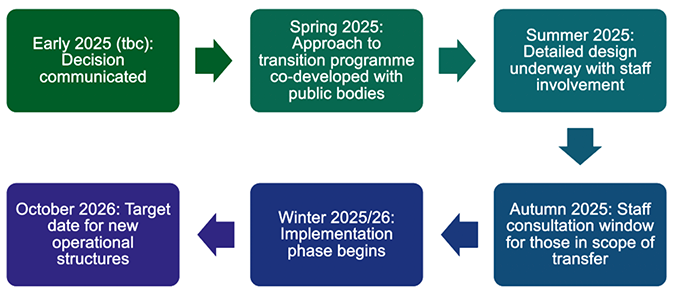
6.7 Principles for implementation
While this management case is not setting out pre-determined structures for the implementation phase, there are some key principles that will guide the approach to the next phase of work.
- Lead with culture – once Ministers have made their decision on a preferred option to deliver simplification of the funding body landscape there will be a need to create a new culture for the future system that draws on the best elements of each of the existing public bodies. This is the first step in developing and delivering a new public body funding landscape for the benefit of Scotland’s learners and employers.
- Start at the top – The collective and collaborative leadership of the Boards and senior leadership teams within Scottish Government, SAAS, SDS and SFC will be vital in ensuring that a strong and consistent message and vision for the future is communicated internally and externally and that the right resources and enabling delivery environment can be created to achieve Ministers’ ambitions.
- Effective engagement – It is clear that there has been a sense of frustration at the level of engagement that has been possible to date. As the next phase of detailed development and delivery is embarked upon it is vital that the people who have the most detailed knowledge and experience of the system are involved in its future design. It is important that fair work principles are at the heart of this engagement.
6.8 Change Control
Change Management
The change management process will be developed in the implementation phase as transitional working groups are stood up and based what is needed to successfully implement Ministers’ decisions to deliver outcomes and measurable improvements. The Project will aim to ensure that the appropriate mechanisms are in place to get organisations, systems, services and staff ready for change.
Where appropriate, staffing resources will be managed by public bodies to meet the demands of the post-school funding body landscape, with opportunities for staff from within Scottish Government and across affected public bodies to gain new skills that can be used in future roles.
Once a Ministerial decision has been made, and implementation plans have been developed, the change management process will evolve to meet the needs of the Project. Where resource, including the movement of the workforce, is required from Public Bodies to support the future functions that are attributed to the simplified post-school funding body landscape, advice will be provided by HR and Legal professionals which will be in line with employment law and transfer of undertakings protection of employment rights (TUPE) or equivalent legislation.
6.9 Benefits Realisation
As outlined earlier in the OBC and within the strategic case, the Project aims to simplify processes and systems, to deliver a more effective post-school funding body landscape for the future.
A critical part of this Project is ensuring that there is a smooth and manageable process for future organisational change. As a result, the benefits accruing from this project will be linked to those from other projects within the current and future programme scope. The Programme Board will establish a common and proportionate approach to benefits management and realisation, to ensure that the expected outcomes and benefits across the Reform programme as a whole are prioritised, tracked and realised.
This common approach will be built out from the Programme level business case, and flow down to the Project-level vision statement as outlined in the project-level strategic case, and the success criteria and appraisal process as outlined in the economic case.
Once a final option for implementation is confirmed, the Project governance arrangements set out here will form the basis of a delivery plan, including the agreed approach to benefits management and realisation. The Benefits Realisation Plan will include the benefits to be prioritised; who will be responsible for delivering those benefits; and which metrics are most appropriate for tracking progress. The progress tracking will include consideration of who benefits and how at each stage of the implementation - linking back to the bespoke project logic model outcomes - and will be incorporated in evaluation activity for the project and programme overall.
A schedule for regular reporting of progress against the Benefits Realisation Plan will be agreed with the Project and Programme Boards as required, providing a link to any changes to the project plan and to risks and dependencies across the programme.
6.9.1 Monitoring and Evaluation
Monitoring and evaluation for this project will follow the same approach as the
wider Reform programme, using the Purpose and Principles outcomes and the
bespoke project-level logic model as the basis for evaluation planning.
Project monitoring will follow the metrics set out in the benefits realisation plans and will be part of a wider framework of measures to track delivery across the Programme as a whole. Any evaluation activity required will follow Government Social Research and Magenta Book guidelines and is likely to require a mixed-methods approach and include the following elements:
- Process measures – to capture how the final agreed option has been implemented, including feedback from partners and stakeholders.
- Output measures – what activity has been delivered and how those involved have experienced implementation of the changes.
- Outcome measures – what changes are observed as a result of the implementation of the agreed option over time.
- Impact measures – what contribution can the project level changes make to the post-school education and skills system and economy overall.
Scottish Government Analysts will also ensure that the activities to monitor and evaluate the project are aligned with activity to design and track benefits realisation for the project and wider programme, seeking to avoid duplication of efforts and expense.
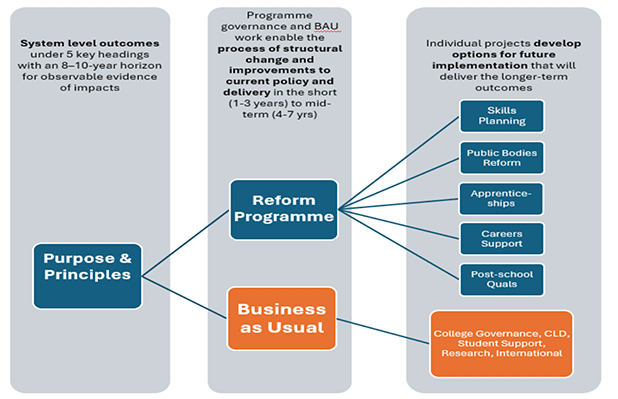
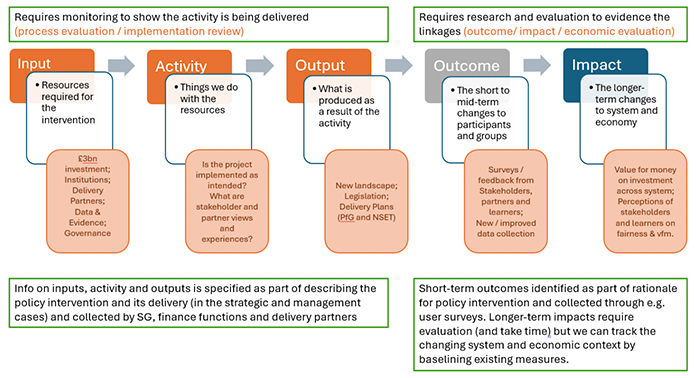
6.10 Strategies and Framework
The strategies, plans and frameworks described in this management case are living documents which will be developed, maintained and updated regularly throughout the lifecycle of the programme to ensure they support delivery. The latest versions will be held in the Scottish Government’s Electronic Records and Document Management system (eRDM).
Contact
Email: postschoolreform@gov.scot
There is a problem
Thanks for your feedback